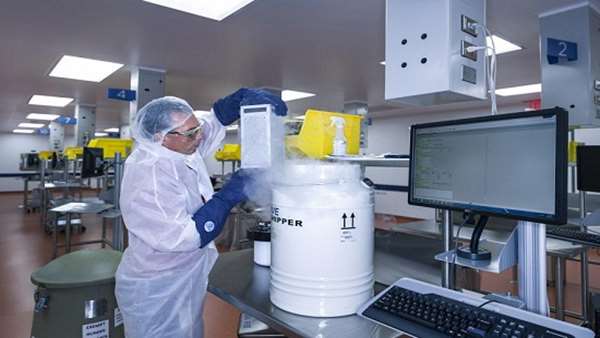In Race for Blood Cancer Therapy, a Chinese Biotech Firm Surges 500 percent
In the global race to use human immune cells to fight cancers, a little-known Chinese firm called GenScript Biotech Corp. is emerging as one of the biggest stock gainers.
In the global race to use human immune cells to fight cancers, a little-known Chinese firm called GenScript Biotech Corp. is emerging as one of the biggest stock gainers.
Among the first Chinese developers of so-called CAR-T cancer therapies, GenScript’s shares have risen more than sixfold since June, when it reported positive results from early studies in 35 patients with a type of blood cancer.
Now the company expects the go ahead from Chinese regulators to start formal human trials as early as the second quarter. The drug could be ready for sale by the end of 2020 if not sooner, Chief Executive Officer Frank Zhang said in an interview.
Novartis AG and Gilead Sciences Inc. have already hit U.S. and European markets with CAR-T therapies, which involve extracting a patient’s immune system cells and modifying them to attack cancers. A string of Chinese firms are jumping in, highlighting the growing ambitions of the country’s pharmaceutical industry, which has long focused on cheap generic copies of branded drugs.
But only a tiny fraction of experimental drugs actually make it to market, and no Chinese biotechs have won approval as yet for CAR-Ts. Nonetheless they’re seeing a surge of money flowing into the industry as the government encourages the development of new drugs. GenScript is already considering a separate listing on the Nasdaq or Hong Kong stock exchange in about three years for its cancer-drug arm, called Nanjing Legend Biotech, Zhang said.
“There’s a lot of capital in China sloshing around," said Laura Nelson Carney, an analyst at Sanford C. Bernstein. “It’s easier to get a new biotech company funded in China than in the U.S. right now.”
Genscript shares climbed as much as 3.3 percent in early trading in Hong Kong on Wednesday morning. The benchmark Hang Seng Index added as much as 0.8 percent.
While the entire field of CAR-T therapy is very new, GenScript’s technology is similar to others in the global field, Nelson Carney said. “They are not working on anything that no one else in the world is working on,” she said. “They don’t have anything that’s totally new and unique.”
GenScript has primarily been a provider of customized synthetic genes and proteins for research use for its clients. At the American Society of Clinical Oncology conference in June, its cancer unit reported that 33 of 35 patients with relapsed or treatment-resistant multiple myeloma in the early study experienced remission within two months of receiving its CAR-T cell immunotherapy.
There are 153 ongoing Chinese studies of CAR-T, second only to 186 in the U.S., Nelson Carney estimates. Those entering the field include Nasdaq-listed Cellular Biomedicine Group and Shenzhen-listed Galaxy Biomedical Investment Co. Local giant Shanghai Fosun Pharmaceutical Group Co. has a joint venture with U.S.-based Kite Pharma Inc. to bring its cancer drug Yescarta to China.
GenScript’s application to launch clinical trials for its drug to treat multiple myeloma, a relatively rare form of blood cancer, was the first of its kind to be accepted by China’s Center for Drug Evaluation and placed under priority review in December.
In December, GenScript announced a partnership with Janssen Biotech Inc., an arm of Johnson & Johnson. The Chinese company received a $350 million payment from Janssen, and the two companies will share future profits and costs in China and overseas markets, according to the deal’s terms.
While the two CAR-T drugs that have been launched can produce remission in previously untreatable patients, both are prohibitively expensive. Novartis priced its treatment at $475,000, while Gilead’s drug has a $373,000 price tag. Their personalised manufacturing also limits access to a small numbers of patients.
A major risk to GenScript is slower-then-expected or failure of its CAR-T drug in clinical trials or final approvals, Jason Siu, analyst at Guosen Securities wrote in a Jan. 3 research report. He estimates that the drug has a roughly one-in-three chance of success. Zhang disagrees and says the possibility for GenScript’s therapy "to become a final commercialized drug is very high."
GenScript’s stock peaked on Jan. 29 after which it tumbled 34 percent amid the rout in global markets. The stock has climbed again in recent days, and is still up more than 500 percent since early June.
Those gains are outsized even by the standards of the volatile biotech market. Juno Therapeutics, a leading CAR-T drug developer which agreed to be acquired by Celgene in January for $9 billion, has risen more than 280 percent over the past year, including a big jump after the Celgene deal was reported.





ارسال به دوستان